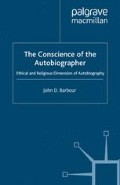Abstract
The classic practitioners of the essay as an exercise of conscience are Montaigne and Samuel Johnson. Johnson and Montaigne differ in their substantive concerns, their ways of proceeding in ethical reflection, and their understandings of the essay form. Montaigne’s essays were published together in ‘Books’ in several editions; Johnson’s Rambler, Adventurer, and Idler essays, shorter and more clearly focused on one topic than Montaigne’s, were published individually as periodical essays or as regularly appearing sections of a newspaper. The essay developed considerably between the 1580s and the 1750s, and the writing of essays played different roles in the personal and professional lives of Montaigne and Johnson. Although they are rather different in many ways, however, the essays of Montaigne and Johnson also share certain crucial ethical concerns, and they are generally recognized as classic examples of the moral essay. In whatever way the outer boundaries of this genre are defined, their writings are central paradigms which give the moral essay its identity and significance both as a literary form and as a mode of ethical reflection. Indeed, their work shapes our very conception of the nature of the essay. Why this is so deserves interpretation.
Access this chapter
Tax calculation will be finalised at checkout
Purchases are for personal use only
Preview
Unable to display preview. Download preview PDF.
Notes
Virginia Woolf, ‘The Modern Essay’, in The Common Reader (New York: Harcourt, Brace and World, 1925) p. 216.
Concordance des Essais de Montaigne, ed. Roy Leake (Geneva: Librairie Droz, 1981) vol. I, pp. 265–6 cites 124 usages of ‘conscience.’
Jerome Schwartz, in ‘“La Conscience d’un homme”: Reflections on the Problem of Conscience in the Essais’, in O Un Amy! Essays on Montaigne in Honor of Donald M. Frame, ed. Raymond C. LaCharite (Lexington, Kentucky: French Forum, 1977) pp. 242–76, surveys Montaigne’s use of the term conscience, and sees his conflicting statements on the nature of conscience as characteristic of Montaigne’s eclecticism.
Quotations by Johnson are taken from Essays from the ‘Rambler’, ‘Adventurer’, and ‘Idler’, edited by W. J. Bate (New Haven: Yale University Press, 1968). This readily accessible and handy edition has been used rather than the complete Yale Edition, which collects all of Johnson’s essays in Volumes II to V.
The subject of Montaigne’s religious views and their relationship with his ethical thought has received extensive treatment. I have been most helped by Donald Frame’s Montaigne’s Discovery of Man: The Humanization of a Humanist (New York: Columbia University Press, 1955)
and especially R. A. Sayce’s The Essays of Montaigne: A Critical Exploration (London: Weidenfeld and Nicolson, 1972) which has influenced much of my discussion of Montaigne.
W. Jackson Bate, The Achievement of Samuel Johnson (Chicago: The University of Chicago Press, 1955) p. 208.
On Montaigne’s skepticism, see Richard H. Popkin, The History of Skepticism from Erasmus to Descartes (New York: Harper, 1968).
W. Jackson Bate, Samuel Johnson (New York: Harcourt Brace Jovanovich, 1975) p. 295. See also pp. 493–6 for further explanation of ‘satire manquée’, a term which unfortunately gives the misleading impression that Johnson tried to write in another genre but failed.
Georg Lukács, ‘On the Nature and Form of the Essay’, in Soul and Form, translated by Anna Bostock (first published 1911; Cambridge, Mass.: The MIT Press, 1974) p. 9.
Among works on Montaigne as an autobiographer, I have been most helped by James Olney, Metaphors of Self: The Meaning of Autobiography, chapter two, (Princeton: Princeton University Press, 1972);
Karl Joachim Weintraub, The Value of the Individual: Self and Circumstance in Autobiography, chapter eight, (Chicago: The University of Chicago Press, 1978);
and Jean Starobinski, Montaigne in Motion, trans. Arthur Goldhammer (Chicago: The University of Chicago Press, 1985).
Herbert Fingarette, Self-Deception (New York: Humanities Press, 1969) p. 143.
Author information
Authors and Affiliations
Copyright information
© 1992 John D. Barbour
About this chapter
Cite this chapter
Barbour, J.D. (1992). Conscience in the Essays of Montaigne and Johnson. In: The Conscience of the Autobiographer. Studies in Literature and Religion. Palgrave Macmillan, London. https://doi.org/10.1057/9780230371088_4
Download citation
DOI: https://doi.org/10.1057/9780230371088_4
Publisher Name: Palgrave Macmillan, London
Print ISBN: 978-1-349-39027-4
Online ISBN: 978-0-230-37108-8
eBook Packages: Palgrave Literature & Performing Arts CollectionLiterature, Cultural and Media Studies (R0)

